
Every young person has to make life-changing decisions about their sexual and reproductive health. However many of them cannot access clear, evidence-based information. IPPF's comprehensive sexuality education programmes enable young people to make informed decisions about their sexuality and health, while building life skills and promoting gender equality.
Articles about Comprehensive Sex Education
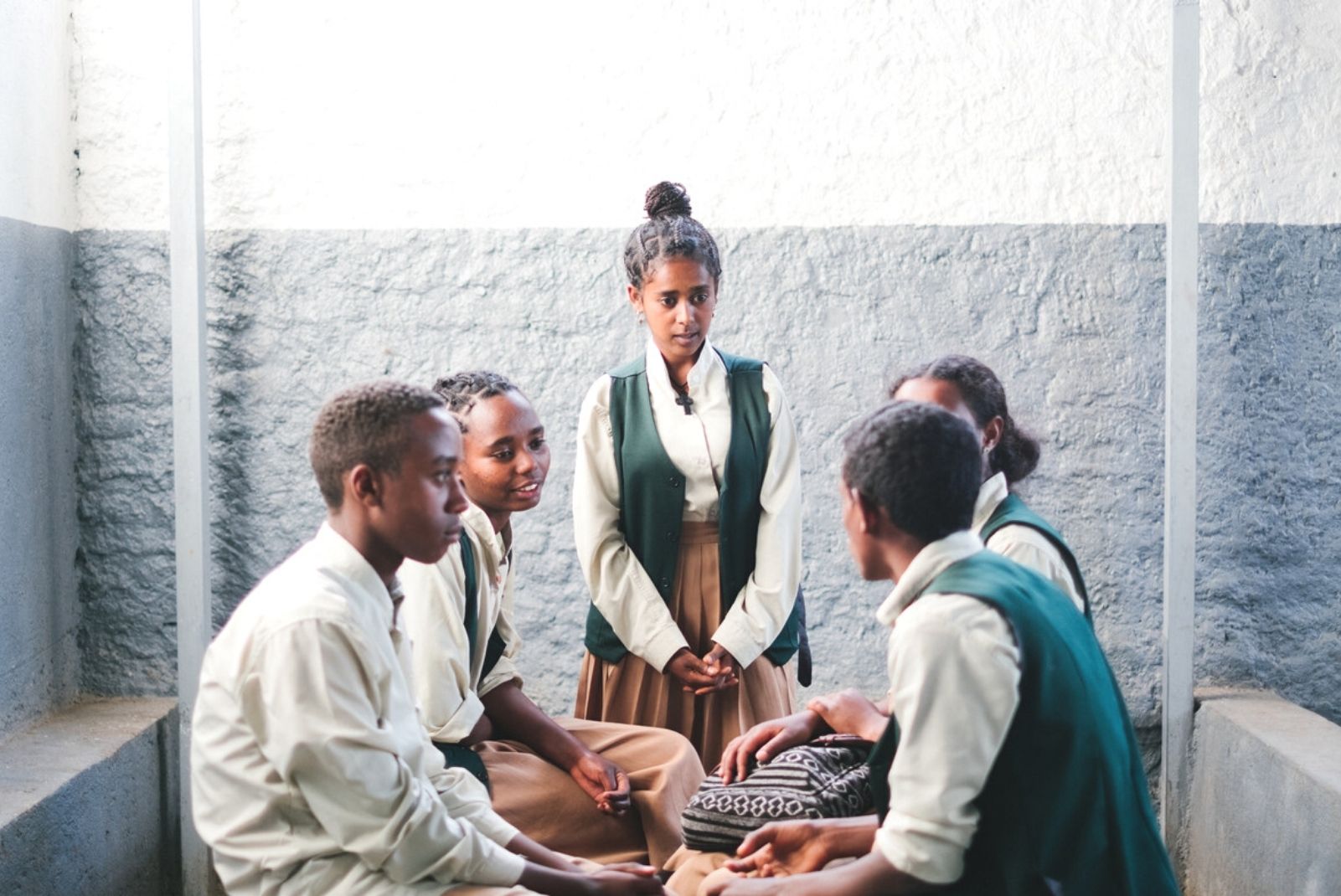
What great sex education looks like around the world
There are more young people in the world than ever before. With this in mind, sex education – or as we call it, Comprehensive Sexuality Education (CSE) – is critical for young people to realizing and claiming their human rights. Sexuality is a fundamental aspect of human life. Being able to express one’s own sexuality freely and openly is central to being human and is important to young people’s well-being, happiness and health. When young people are supported to become critical thinkers, empowered in their sexuality, and informed about their sexual and reproductive choices, the positive impact is felt across society. Without great CSE, young women and girls in particular can experience severe forms of inequalities – including sexual violence, child, early and forced marriage, female genital mutilation (FGM), and other harmful practices. So you get the point – CSE is absolutely vital, and this is what it looks like around the world when it’s done brilliantly: Ethiopia Every Saturday, about 40 people gather at a youth center in Mekelle, Ethiopia, to hear about a subject they don’t get taught in schools, and don’t want to discuss with their parents – sexual and reproductive health. This youth center, located in the Tigray region, is run by the Family Guidance Association of Ethiopia. It has a playground and library at the front for studying and socializing, and in the back lies a clinic offering free contraceptives, abortion care, and STI testing. The center is aimed at people aged between 10 and 24 years old and runs a range of activities, including weekend group sessions where young people usually do some performance art based on a particular SRH subject, and hold debates and discussions around a coffee ceremony – a traditional Ethiopian social gathering. “I’m proud of this work because I am educating my friends and my family and protecting them,” says Teklehaimanot, a young volunteer at the center. Learn more about the Mekelle center
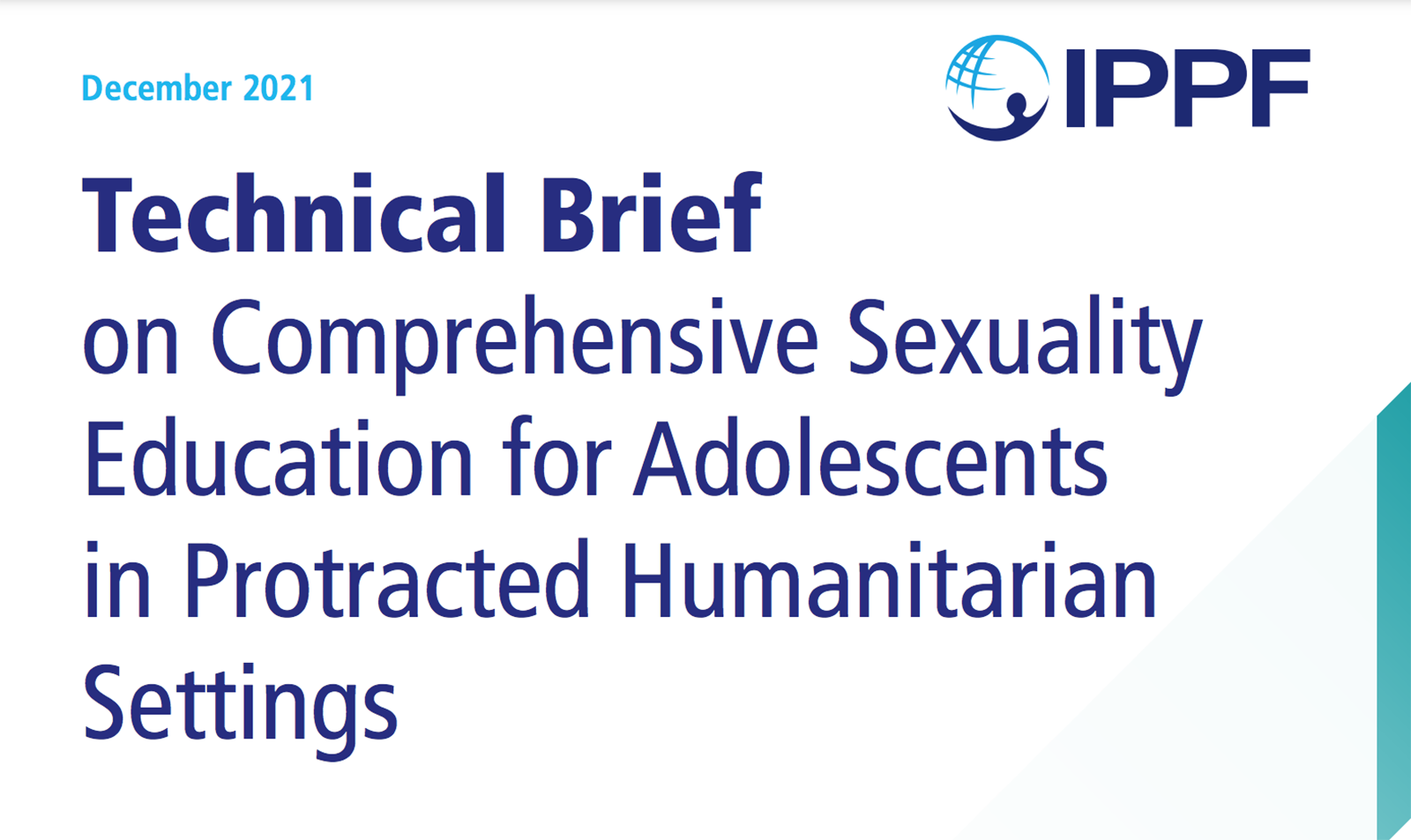
Technical Brief on Comprehensive Sexuality Education for Adolescents in Protracted Humanitarian Settings
In line with the IPPF Humanitarian Strategy 2018–2022, we present promising practices to guide IPPF Member Associations and partners in the provision of CSE, specifically when operating in protracted humanitarian crisis environments and call the humanitarian community to action to recognize and adolescent sexual and reproductive health (ASRH) needs and rights in emergency response programming. This technical brief is available below in English, Arabic, French, and Spanish.
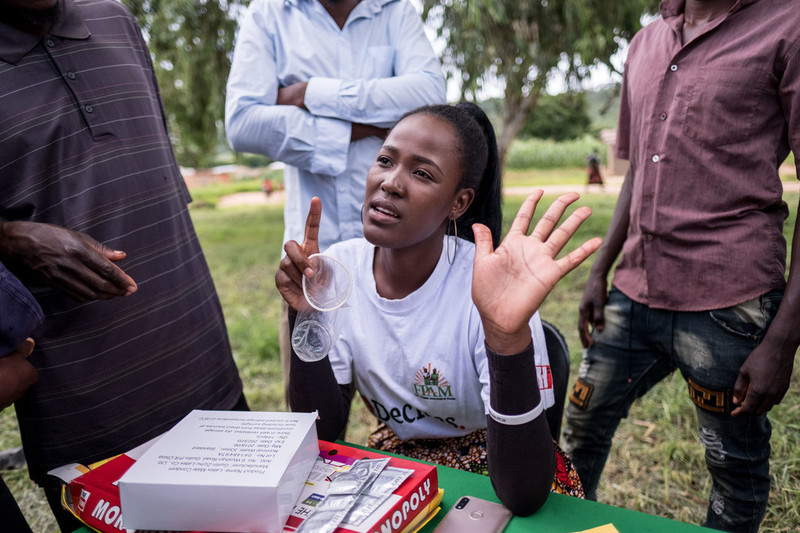
In Pictures: International Youth Day 2021
Last year, IPPF and our global Member Associations delivered a staggering 98.2 million sexual and reproductive health services to young people aged 25 and under – that’s approximately 45% of all services delivered. When young people are able to access and manage their sexual and reproductive health and rights (SRHR) with dignity and care, their chances of thriving in life increase, and as such we work with and for youth populations around the world in many ways. Take a look at some of the ways we have been involved with this and, more importantly, how young people themselves have been the driving force behind the fight for SRHR for all. Malawi Young volunteers connect their peers to information and contraceptive care Kondwani, a 22-year-old Youth Action Movement (YAM) volunteer, not only distributes condoms locally, she also challenges her peers to show her on a wooden model how to use them, because she knows that this can pose a problem for some people.Activities like this in hard-to-reach areas are one of many that the YAM delivers across Malawi. Trained and hosted by Youth Life Centres, which provide sexual and reproductive healthcare aimed at youth, volunteers like Kondwani meet up regularly and reach out to their peers in schools, universities, and on social media.Learn more about Kondwani Share on Twitter Share on Facebook Share via WhatsApp Share via Email Poland Defending human rights in the face of unrelenting attacks Nadia believes activism can change the world. Over the last few years in Poland, women’s reproductive choices have been stripped back at an alarming rate. The young activist wants to reverse this erosion of women’s rights by campaigning for better reproductive, labour and social rights across the country. Nadia is painfully aware that in Poland, where public discourse is dominated by men, the belief that “children and young women have no voice” still reigns.As a result of her activism, Nadia has become the target of visceral personal attacks online, unrelenting violent behaviour, sexism & discrimination – but she hasn't given up.Learn more about Nadia Share on Twitter Share on Facebook Share via WhatsApp Share via Email Mali Using street dance to teach about consent, contraception and more Abdoulaye Camara is the best dancer in the neighbourhood, and he’s not afraid to show it. But Abdoulaye’s moves aren't just for fun – he's head of the dance troupe of the Youth Action Movement, belonging to the Association Malienne pour la Protection et la Promotion de la Famille, which uses dance and comedy sketches to talk about sex.“We distract them with dance and humour and then we transmit those important messages about sex without offending them,” explains Abdoulaye. Sexuality, STIs, consent, early/unintended pregnancy, contraception, and more – no topic is off the table for Abdoulaye and his troupe. Learn more about Abdoulaye Share on Twitter Share on Facebook Share via WhatsApp Share via Email Aruba Providing information and contraceptive care to young people in school Access to information and contraceptives has always been a priority for Famia Planea Aruba (FPA) – whether through their office, a delivery service, or in schools. For over 15 years FPA has worked in partnership with one of the largest secondary schools on the island. The FPA team visits the school every month to provide guidance, counselling, and contraceptive care to students, and to help ensure they stay in school to complete their education.The FPA team works with students to build trust and ensure they feel safe to talk openly. This helps to provide a sense of consistency for the student and the team, who are better able to notice if something changes, and if a student needs a referral to a medical doctor or other organization for additional treatment.Learn more about FPA Share on Twitter Share on Facebook Share via WhatsApp Share via Email Indonesia Surviving an earthquake as a young mother during COVID-19 Shortly after becoming a mother at 18, Herlina’s home was struck by a powerful earthquake in January, forcing her and her baby Nur to flee. She had to deal with this terrifying situation alone, all during the COVID-19 pandemic as well.The Indonesia Planned Parenthood Association (IPPA) health volunteer team were able to support Herlina by providing sexual and reproductive healthcare services, specifically advising Herlina on postpartum care. The team also gave Herlina dignity kits, which included sanitary pads, underclothes, and soap to maintain proper hygiene, which is a common challenge in displaced communities.Learn more about Herlina Share on Twitter Share on Facebook Share via WhatsApp Share via Email Kiribati Abe the ‘Youth Warrior’ “It’s time to be talking about sexual and reproductive health and rights (SRHR) early on, let’s not wait until young people get in trouble.” Abe's voice reveals the energy and passion of someone who is doing what they were destined to do.He is a proud member of the LGBTI community, as well as of his local church – two worlds he tries to bring together in order to spread important healthcare messages among other young people.Along with SRHR, Abe also cares deeply about tackling climate change: "In my role as a youth worker and activist, I tell people to fight climate change: to grow more mangroves and to clean up the beach. Because we love our Kiribati."Learn more about Abe Share on Twitter Share on Facebook Share via WhatsApp Share via Email Tanzania Creating safe spaces for young people to get healthcare services without judgement 20-year-old Zahra Amri has been working with Chama cha Uzazi na Malezi Bora Tanzania (UMATI) since she was 13. Starting out as a Youth Action Movement member, she then became a peer educator for young people and now works at UMATI’s Youth Center.“There are several issues that as youth we must talk about, no matter what,” says Zahra. “The community and parents have myths and misconceptions that youth should not be able to speak about sexual reproductive health. But this situation affects most adolescents who face many challenges in life.For Zahra, it’s imperative that young people are educated about how to identify and report gender-based violence (GBV), as well as learning all about menstruation (particularly for girls living in poverty), gender equality and more.Learn more about Zahra Share on Twitter Share on Facebook Share via WhatsApp Share via Email
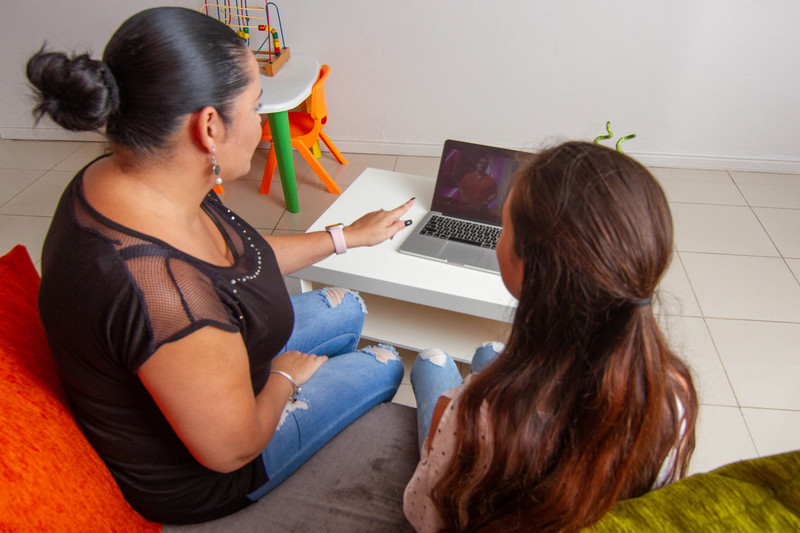
COVID-19 inspires new approach to reaching young people during lockdown
Provision of sexual and reproductive healthcare for all, regardless of age, is at the core of Famia Planea Aruba’s (FPA) work. Over the years FPA has developed different information packages specifically aimed at reaching and supporting young people, families, and educators. The inspiration for delivering comprehensive sexuality education digitally to young people was propelled by the COVID-19 lockdown. Like other frontline healthcare providers, FPA was faced with unforeseen challenges about how to continue reaching their communities. Undeterred, the team embraced the challenge to create, develop, and launch FPA’s first Online Puberty Educational News Program (OPEN). Responding to clients' needs digitally “In the last few years, FPA’s in-school Comprehensive Sexuality Education (CSE) program was growing rapidly, and then all of a sudden we hit a wall; our Island was in complete lockdown and all schools were closed. At first, we were very sad, since we were fully booked for the upcoming few months, and would lose the opportunity to reach thousands of young people”, says Evelyn Yarzagaray, FPA’s Executive Director. Typically, during April and May FPA usually focuses on students between the ages of 11 and 13 and supporting with the transition from elementary school to secondary school. At this age young people are starting to experience changes to their bodies and hormones. “We were all of a sudden bombarded with parents who started requesting one-on-one counselling sessions for their kids, but due to safety regulations this was not an easy option. That was when we started looking for a way to reach both parent and child in the safety of their own homes. By converting materials used during our in-person CSE program, we developed an educational video that can be viewed by both parent and child”, says Evelyn. The OPEN platform has been designed with a colourful background, emojis, and animation to appeal to its target audience. Users can access valuable information through the FAQ section, international news, and video content such as an interview with a Family Physician. “The filming and editing were the longest and most difficult part of the entire process, but once it was launched, we immediately saw that is was completely worth it, reaching over 42,000 people on social media”, Evelyn says. “I know it's all part of the growing up process” Jeanira, 37, is a doctor’s assistant and has two young children aged two and 12. She has been a member of FPA for many years, but only recently learned that FPA provides healthcare for all ages and stages of life – particularly young people. “About a year ago I had begun researching the best way and time to start talking to my daughter about her upcoming body changes, sexuality, and puberty in general”, explains Jeanira. It was a family member who suggested the FPA video on social media about puberty that was in Jeanira’s native language. “The video is fun, educational, featured local professionals and related to my daughter’s age. I love the fact that I could introduce the video to her and let her watch it in her own comfort zone. At the end, it did stimulate conversations and questions for a few days after and it truly made it easier for us to talk about some of the topics that can sometimes be a little hard to approach”, says Jeanira. 11-year-old Xiqiën really enjoyed the video: “My favourite part was to be able to recognize some changes that I am going through right now. There are some changes that I would like to skip but I know it’s all part of the growing up process. I’m so thankful that FPA had the idea to make such a fun video for us to learn from. There was some stuff that I already knew, but I also learned some new things. I did ask my mom a lot of questions after the video, mostly because they said that everyone is different, and I really wanted to know how my mom is different from me. I don’t feel quite as worried to talk to my mom about these things anymore, I know that she will try to help.”

Providing information and contraceptive care to young people in school
Accessibility to information and contraceptives has always been a priority for Famia Planea Aruba (FPA) – whether through the office, delivery service, or in schools. For over 15 years FPA has worked in partnership with one of the largest secondary schools on the island. The FPA team visits the school every month to provide guidance, counselling, and contraceptive care to students, and to help ensure they stay in school to complete their education. “One of my first experiences providing comprehensive sex education with FPA was at the EPB School, during my education as a social worker. Many years later I still very much enjoy this”, says Richenella, FPA’s Finance and Information, Education and Communication (IEC) support staff. Building trust FPA’s client is at the heart of its healthcare provision. The FPA team works with students to build trust and ensure they feel safe to talk openly. This helps to provide a sense of consistency for the student, as well as efficiency for the team being familiar with specific students and cases. They are better able to notice if something changes, and if a student needs a referral to a medical doctor or other organization for additional treatment. “The consultations are always fun; you get a change of scenery by stepping out of the office. Over the years you see so many faces and still somehow you manage to remember most of them. After just a few visits you can start to build a profile of most students; you can start to tell who the class clown is, the Mister Popular, the shy one, the loud one, and the one who just wants to take his time to avoid going back to class”, Richenella laughs. Working in partnership with the school social worker FPA places great value on the 14-year relationship they have with Adriana, the social worker at EPB San Nicolas School. Adriana is the person who has the most contact with the students, and the one most student’s turn to when they need help. “Most of the time you get to have fun with the students, however every now and then you will come across a heartbreaking case. Since Aruba has so many different migrants, very often you will come across one person who is not insured at the moment, who needs products and can’t afford it – and you figure out a way to help”, Adriana says. For registered youth under 21 years of age, the costs of the healthcare provision are covered by the national health insurance, however, some students fall outside of the system. “For our second, third and fourth-year students, FPA has been collaborating with us to provide a monthly session where the students receive contraceptives and guidance on school grounds. Since around this age, most of our students are already sexually active, we try to help them stay safe in and out of school.” “The love, patience, and dedication that FPA has shown our students over the years are outstanding. At the beginning of the COVID-19 crisis we had to stop the consultation hours, but thankfully we are now back at it, bigger and better. Due to the collaboration with FPA we were able to finish out our 2018-2019 school year with no new pregnancies, which was a first for our school. We hope to accomplish this again, now that we can continue our consultations, and keep our kids educated and in school for as long as we can so they can achieve the best possible future”, Adriana says.

"Girls have to know their rights"
Aminata Sonogo listened intently to the group of young volunteers as they explained different types of contraception, and raised her hand with questions. Sitting at a wooden school desk at 22, Aminata is older than most of her classmates, but she shrugs off the looks and comments. She has fought hard to be here. Aminata is studying in Bamako, the capital of Mali. Just a quarter of Malian girls complete secondary school, according to UNICEF. But even if she will graduate later than most, Aminata is conscious of how far she has come. “I wanted to go to high school but I needed to pass some exams to get here. In the end, it took me three years,” she said. At the start of her final year of collège, or middle school, Aminata got pregnant. She is far from alone: 38% of Malian girls will be pregnant or a mother by the age of 18. Abortion is illegal in Mali except in cases of rape, incest or danger to the mother’s life, and even then it is difficult to obtain, according to medical professionals. Determined to take control of her life “I felt a lot of stigma from my classmates and even my teachers. I tried to ignore them and carry on going to school and studying. But I gave birth to my daughter just before my exams, so I couldn’t take them.” Aminata went through her pregnancy with little support, as the father of her daughter, Fatoumata, distanced himself from her after arguments about their situation. “I have had some problems with the father of the baby. We fought a lot and I didn’t see him for most of the pregnancy, right until the birth,” she recalled. The first year of her daughter’s life was a blur of doctors’ appointments, as Fatoumata was often ill. It seemed Aminata’s chances of finishing school were slipping away. But gradually her family began to take a more active role in caring for her daughter, and she began demanding more help from Fatoumata’s father too. She went back to school in the autumn, 18 months after Fatoumata’s birth and with more determination than ever. She no longer had time to hang out with friends after school, but attended classes, took care of her daughter and then studied more. At the end of the academic year, it paid off. “I did it. I passed my exams and now I am in high school,” Aminata said, smiling and relaxing her shoulders. "Family planning protects girls" Aminata’s next goal is her high school diploma, and obtaining it while trying to navigate the difficult world of relationships and sex. “It’s something you can talk about with your close friends. I would be too ashamed to talk about this with my parents,” she said. She is guided by visits from the young volunteers of the Association Malienne pour la Protection et Promotion de la Famille (AMPPF), and shares her own story with classmates who she sees at risk. “The guys come up to you and tell you that you are beautiful, but if you don’t want to sleep with them they will rape you. That’s the choice. You can accept or you can refuse and they will rape you anyway,” she said. “Girls have to know their rights”. After listening to the volunteers talk about all the different options for contraception, she is reviewing her own choices. “Family planning protects girls,” Aminata said. “It means we can protect ourselves from pregnancies that we don’t want”.
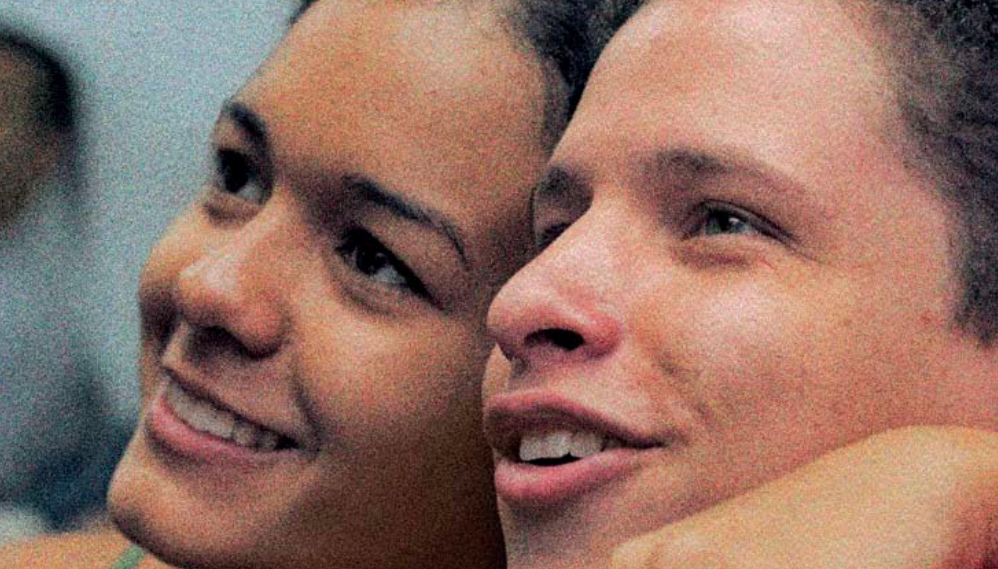
It's All One Curriculum
Researchers have identified gender inequality as a key factor driving the AIDS pandemic. Policymakers have called for sexuality and HIV education that emphasizes gender equality and human rights. Educators want to teach young people the critical thinking skills needed to build compassionate and just societies. It's All One Curriculum responds to these calls.

How to masturbate if you have a penis
It has been proven that masturbation is good for your health: it can reduce stress, can help you sleep better, and make you feel more confident with understanding what you do and don’t like sexually. And, as you are your ‘safest’ sexual partner, there is zero chance of unintended pregnancy and HIV/STI transmission, compared to having sex with a partner or partners. Masturbation is healthy and perfectly normal – it’s an act of self-care and exploration that can help build your sexual confidence. It’s your body and no one should make you feel ashamed or wrong for showing it some love. Next time you feel self-conscious about masturbating, remind yourself that it is good for your health, it’s perfectly normal, and most people do it. Find your rhythm and take your time Long strokes. Short strokes. Rapid strokes. Using your hand wrapped around the shaft (i.e. the length of the penis), find what works for you by experimenting with technique and pressure until you know what will make you orgasm. The tip of the penis and the testicles/scrotum are also good sources of pleasure, so feel that out too. Take your time when masturabating, listen to your body and enjoy exploring what works for you. And remember, preferences change over time so if your go-to rhythm is not working for you this time, try something new! Lube it up The friction of your hand directly onto your penis can cause some desensitization of your penis over time. Lube can be important and enjoyable for many sex acts from masturbation to sexual intercourse, as it reduces friction and can feel really great. Some people use lotion to masturbate with. We recommend using a water-based lube to avoid any irritation. Explore your pleasure spots Masturbation does not need to focus solely stimulating the penis or the testicles. People are aroused by many different areas including playing with their nipples, prostate (located internally) stimulation, and more. So get exploring your own body and you may surprise yourself by the various erogenous spots you discover. Incorporate sex toys Incorporating sex toys when you masturbate can help add some fun to your routine. You can try a traditional vibrator, using it on the penis or testicles, or you can opt for a masturbation sleeve. And don’t forget the prostate, which can be stimulated via the perineum, the area between the penis and the anus – there are a number of toys specifically for this if you’re interested. Talk about it To remove the stigma that surrounds masturbation, we need to be talking about it. (We've also written about masturbating if you've got a vagina, if you want to take the conversation further!) The more healthy discussion on masturbation, the quicker we can break the taboo surrounding it. Talking to your friends can help build confidence and creates a safe space for you to get together to talk about and ask questions on masturbation. Talking to your sexual partner or partners about what you like, what you don’t like, and your mutual fantasies can help build your sexual confidence which can lead to great sex.

How to masturbate if you have a vagina
Did your sex education include anything about masturbation? Ours neither! That’s why we’d love to talk to you about it – specifically, if you have a vagina. (If you’ve got a penis, we’ve got some info for that too.) First things first: there is absolutely nothing shameful about masturbation! Not in the slightest. It is perfectly normal and healthy. It can help relieve stress, and is a good way of exploring your own body and sexuality, and it just feels really good! People of all ages, genders and sexualities do it. People in every single country in the world do it. Single people and people in relationships do it. Some people do it frequently, others do it occasionally and some don’t do it at all. It’s all normal. We’re glad we’ve cleared that up! Getting started Next, how should it be done? There are plenty of ways, and it’s all about finding what works for you. The two main ways people with vaginas masturbate is either clitorally or vaginally. Before you get going on the good stuff, a helpful place to start may be to see what you look like down there, by getting a hand mirror and trying to locate the clitoris, vagina opening, labia etc. The picture on the left might help you match up what’s what, but don’t worry if you’re still not sure – all vaginas are different and that’s OK! Stimulating the clitoris The clitoris (or clit), marked in the picture, has thousands of nerve endings making it a highly sensitive area, and is how most people with vaginas achieve orgasm. It can be stimulated with your fingers, or with a vibrating sex toy (more on that later). Using either your fingers or a sex toy (or a combination of both) try rubbing the clitoris in circular or back-and-forth motions, with varying levels of pressure until you find something that brings you to a nice state of arousal. You can also get the different parts of the labia involved (consult the picture again to find them), by seeing if stimulating them in a similar way feels good. The G-spot The vagina may also be a source of joy for you, specifically the G-spot. It’s located internally, and can be trickier to find and stimulate. To find it, slowly insert one or two fingers into your vagina opening, and curl them upwards to touch or rub the textured area behind your pubic bone. Some people find this extremely satisfying, though it’s also pretty normal if it isn’t pleasurable or orgasm-inducing for you at all. What products should I use? If you’re just starting out, you could consider a smaller sex toy, such as a bullet to stimulate your clitoris and labia. There are also toys specifically for the G-spot that can help you explore this sometimes-mysterious erogenous zone too! You might find that adding a few drops of lube onto your body or sex toy might enhance the pleasure too. Remember to wash sex toys before and after use, and to wash your hands before and after masturbating or any kind of sexual activity. Positions For all types of masturbation, you might also want to think about positions. Many people choose to lie back on their bed for comfort, but you might find that, for example, kneeling, sitting or standing up works better, or masturbating in the shower might do it for you. How long should it take? There’s no time limit for how long it may take to orgasm (which typically feels like an intense build-up, culminating in a pleasurable release), so take as long as you need. Is it safe to masturbate? No matter what you’ve heard, masturbation is completely safe – nothing bad will happen to you if you do it. In many ways it’s actually the safest form of sex there is, as there’s no risk of HIV/STI transmission or unintended pregnancy. Just make sure you masturbate in private, and if you choose to do it with a partner (which can also be a lot of fun), ensure that they have consented first. Not only is it safe, it is probably a lot more common than you think. All in all, there is no right or wrong way to masturbate – it’s all about trying out different techniques to find something that works for you. Enjoy!
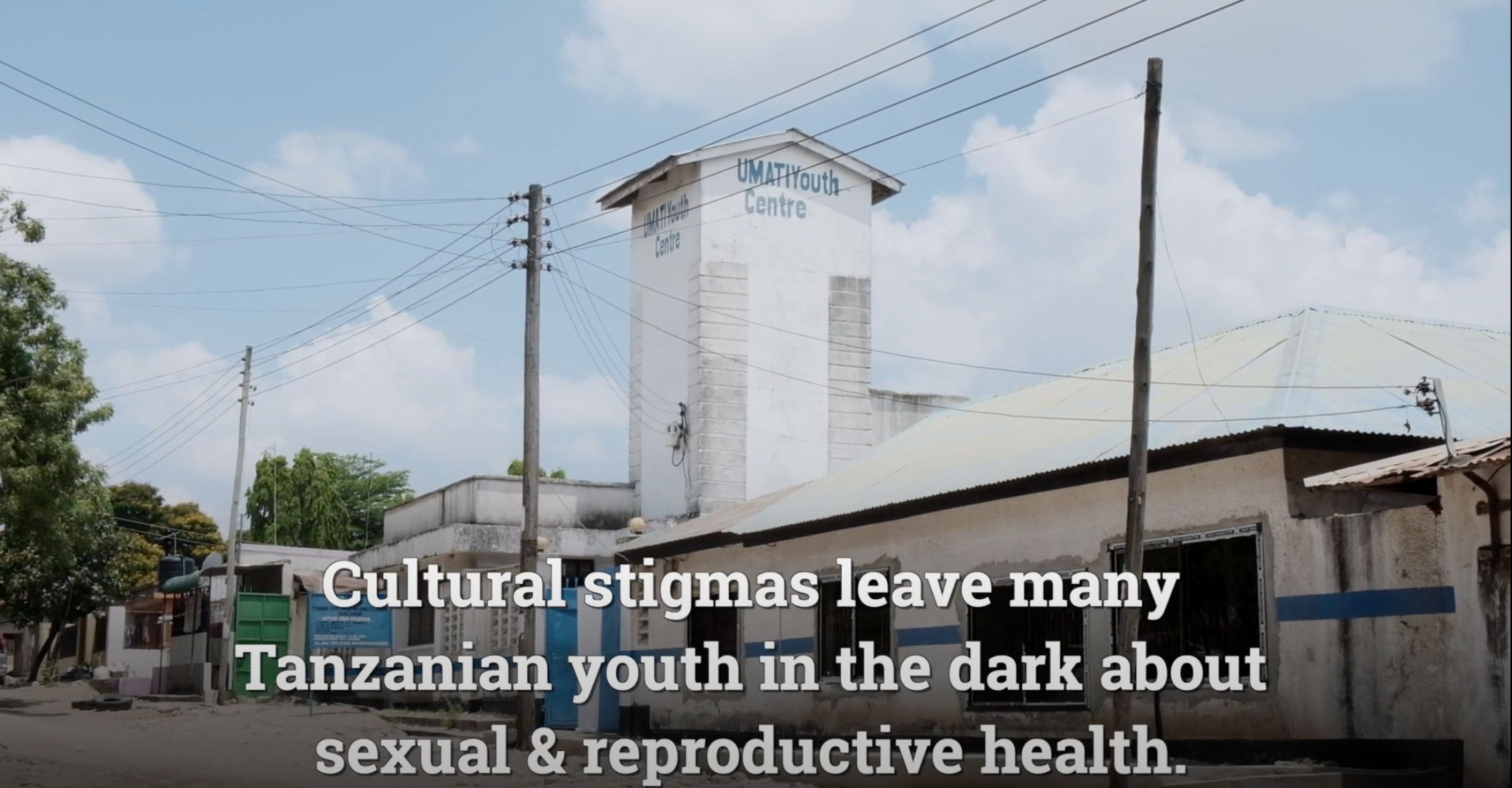
Tanzania: A youth center on a mission to destigmatize sexual health
Cultural stigmas leave many young people in Tanzania in the dark about their sexual and reproductive health and rights. Our Member Association - Chama cha Uzazi na Malezi Bora Tanzania (UMATI) - has come up with a solution at their youth center in Dar es Salaam: peer-to-peer educators. Every week over 100 youth sign up for services and training at the center. In 2017 the Global Gag Rule pulled funding from UMATI, however, the Belgian Government stepped in with emergency funding which allowed the center to remain open through the She Decides project.
Pagination
- Previous page
- Page 2
- Next page






